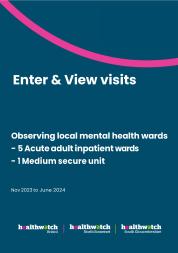Report: Mental health support for people with long term physical health conditions

People who have long term conditions have a higher prevalence of experiencing common mental health disorders, such as anxiety and depression.
The most common long term condition (LTC) people who spoke to us had was arthritis, followed by type 1 diabetes. Others reported living with LTCs such as irritable bowel disease, ulcerative colitis, and coeliac disease. Just over half of the people we spoke to had more than one LTC.
In total, we heard from 89 people via a survey and focus group.
What did you tell us?
- Most people said that their physical health affects their mental health to some extent.
- Physical effects of LTCs included sleep loss, pain, and limited mobility. These stopped people working, enjoying their hobbies, exercising, socialising, and caring for loved ones and themselves.
- Some people felt like a burden to others in their life.
- People felt anxious about their physical health, which was worsened by not knowing the causes of their symptoms, and fluctuations in how they would feel on a daily basis.
- It is upsetting to feel dismissed or not listened to by healthcare staff about their LTC and physical health. Just over half of the people we heard from had not been asked often about their mental health by a healthcare professional.
I had to leave my last job because they couldn't accommodate my symptoms, so have been unemployed for several years now. This has really knocked my confidence.
Downloads
Shane Devlin, Chief Executive, BNSSG ICB and Dr Geeta Iyer, Salaried GP and Deputy Chief Medical Officer, BNSSG ICB, said:
"This is an interesting report that shines a light on how, in trying to deliver good evidence-based practise, practitioners can miss what is important to the person. This is particularly important in general practice where most long-term condition consultations occur.
"Balancing the limited time in general practice and pressure on appointments with the holistic approach needed is hard, but recognition for this approach is there with the funding for Additional Roles Reimbursement Scheme roles. Many practices and patients understand the need for continuity of care here and there is a need for further discussion about how that is best delivered that encourages personal autonomy and empowerment."
Next steps
- Primary care to provide information about the individual’s LTC, self-management advice and tools, and possible mental health impacts, at the time of LTC diagnosis.
- Healthcare providers to give information about mental health support for people with LTCs in easily accessible formats: digitally (online websites, apps) and hard copies (waiting room flyers, posters).
- Healthcare professionals to routinely enquire about mental health at LTC
appointments. - Healthcare providers to address known barriers to mental health support and offer appropriate solutions on a patient and service level.
- Mental health service providers to signpost individuals to other available forms of support, such as peer support, while they are on mental health waiting lists.
- Primary care to annually review the need for ongoing mental health support with patients.
- Identification and expansion of peer support networks and activity groups from commissioned voluntary sector sources for people with LTCs.
- Increase patient access to social prescribers.
- Mental health service providers to ensure that the support people are
receiving is appropriate for the stage of their health journey. - Training for mental health professionals around understanding the
mental health impacts of LTCs and related stigma. - Training for primary care around pathways for referrals between physical
health services and mental health support. - Expansion of integrated holistic health services where patients can
receive support for both their physical and mental health needs related
to LTCs. - Primary care to regularly review individual’s LTC medication, including
pain relief and alternative coping methods for painful LTCs.
If you are living with a long term condition, please tell us about your experience by clicking the pink 'Talk to us' button below and completing our feedback form.

